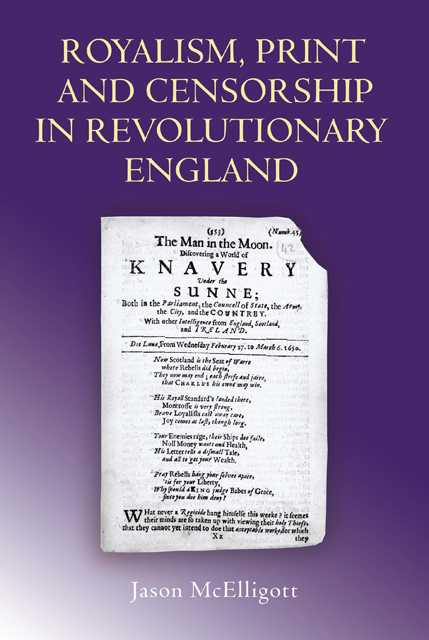Book contents
- Frontmatter
- Contents
- Illustrations
- Acknowledgements
- Abbreviations
- Introduction: Royalism and its Problems
- 1 Royalists and Polemic in the 1640s
- 2 The Politics of Sexual Libel
- 3 The Twists and Turns of Royalist Propaganda
- 4 Authors, Shifting Allegiances and the Nature of Royalism
- 5 Printers, Publishers and the Royalist Underground
- 6 Hunting the Royalist Press
- 7 The Theory and Practice of Censorship
- 8 A New Model of Press Censorship
- Conclusion
- Select Bibliography
- Index
Conclusion
Published online by Cambridge University Press: 10 March 2023
- Frontmatter
- Contents
- Illustrations
- Acknowledgements
- Abbreviations
- Introduction: Royalism and its Problems
- 1 Royalists and Polemic in the 1640s
- 2 The Politics of Sexual Libel
- 3 The Twists and Turns of Royalist Propaganda
- 4 Authors, Shifting Allegiances and the Nature of Royalism
- 5 Printers, Publishers and the Royalist Underground
- 6 Hunting the Royalist Press
- 7 The Theory and Practice of Censorship
- 8 A New Model of Press Censorship
- Conclusion
- Select Bibliography
- Index
Summary
We do not know enough about royalism. This important gap in our knowledge of the Civil Wars is due to the neglect of loyalism by most historians of the period and the conceptual and methodological conservatism of those who are interested in the men who supported the Stuarts. This book cannot plug all of the gaps in our knowledge of royalism but it is intended to sketch a way of approaching the subject which may be of benefit to others. The poorly printed ephemeral royalist newsbooks provide a unique perspective on the political and religious turmoil which engulfed Britain during the late 1640s. The losers of the First Civil War were reinvigorated by a sea-change in public opinion during the course of 1647, and a conscious effort was made to use print to appeal to the people on behalf of the king and his supporters. The newsbooks formed a key part of this propaganda effort. This was a royalism comfortable with the need to court public opinion, and, at least initially, confident of winning the populace to its side. The newsbooks challenge our preconceptions of what it meant to be a royalist. They allow us to abandon the varying prescriptive definitions of royalism – what people must have thought or believed in order to qualify as royalists – in favour of a descriptive definition which examines what actual royalists thought, believed or argued. We can now see that a royalist was simply somebody who, by thought or deed, identified himself or herself as a royalist and was accepted as such by other individuals who defined themselves as royalists.
These flimsy newsbooks had an advanced understanding of strategy and tactics, of the best way to appeal to their intended audience. They have been dismissed in the past as nothing more than sub-literate pornographic rags. It has been argued, however, that the outrageous sexual slurs contained in these titles must be read as a conscious strategy to discredit their Puritan enemies as unnatural hypocrites and liars who did not merit respect or obedience. Sexual libel was an effective strategy for attacking one's enemies, but it was only one aspect of a discourse that could draw on a broad range of culturally significant symbols, allusions, references and metaphors from a variety of fields of human experience and endeavour.
- Type
- Chapter
- Information
- Royalism, Print and Censorship in Revolutionary England , pp. 225 - 228Publisher: Boydell & BrewerPrint publication year: 2007

